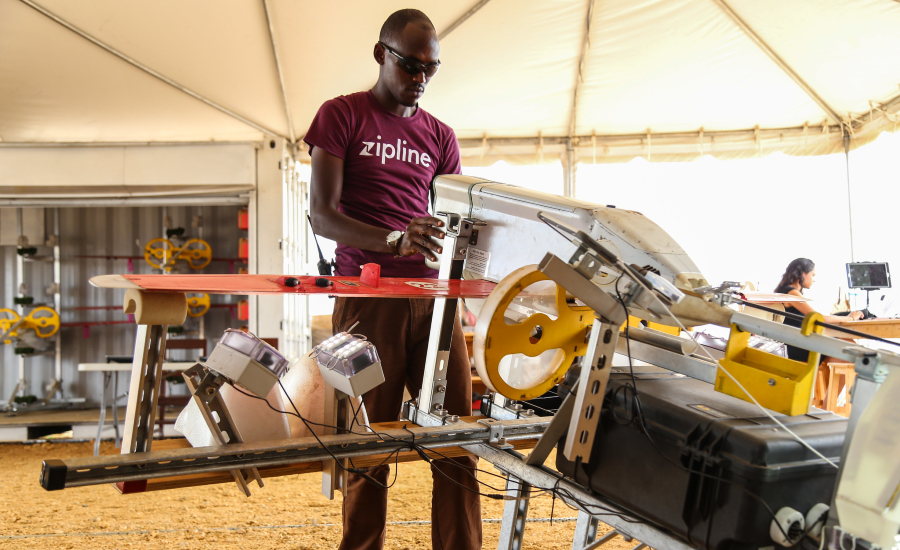Leveraging Africa’s Technology Boom to Protect U.S. Interests
The United States should seize the opportunity to help Africa develop its tech infrastructure and business sector.

Published by The Lawfare Institute
in Cooperation With

African leaders, organizations and individuals are increasingly investing in Africa’s expanding technology sector, presenting U.S. policymakers with a unique opportunity to reframe the U.S. approach to Africa and support an endeavor that has the potential to mitigate against the underlying factors driving many of Africa’s current and potential conflicts. In the past two years, the number of tech hubs in Africa increased by more than 25 percent, from 442 in 2018 to more than 600 in 2020. African startups raised $1.34 billion in venture capital last year, compared to $725 million in 2018 and $203 million in 2017. A relatively new batch of foreign government partners and a growing number of U.S. and foreign businesses are aiding these startups and entrepreneurs on their journeys. By rebalancing the way U.S. policymakers see Africa—moving away from the image of aid-dependent countries toward a vision of expanding, regional pockets of innovation and prosperity—the United States could leverage these trends to bring to bear its own experience supporting entrepreneurship and innovation to create new partnerships throughout the continent.
Africa’s 54 countries are home to 1.3 billion people; 20 percent of the population is between the ages of 15 and 24, and that figure is expected to increase to 42 percent by 2030, according to U.N. data. African leaders and policymakers are developing plans and programs intended to ensure that this youthful population serves as a boost to economic growth and potential, rather than a detriment to stability. Education, entrepreneurship and technology have emerged as the key lines of effort in policies designed to ensure Africa’s youth realize their full potential, particularly those in areas where the basic infrastructure for the tech industry is already in place. In 2019, the African Union launched an online certification program to allow youth to learn hirable skills remotely, while private organizations, like Kenya-based RCD Africa, seek to create consortia and partnerships to advance children’s coding and programming skills continent-wide.
African entrepreneurs are not in this alone. They are benefiting from partnerships with countries and companies outside the continent that allow them to collaborate in growing the continent’s tech sector in ways that solve current and future economic and security problems. South Korea is leveraging its development experience to support specific African efforts to develop enterprises and technology. South Korean government entities last year partnered with the African Development Bank to deploy agricultural drones to Tunisia, with plans to expand that program to other parts of the continent with the goal of enhancing long-term food security. The Korea-Africa Foundation, sponsored by the South Korean government, works to raise awareness about the African startup market among Korean entrepreneurs and create opportunities for Korean and African entrepreneurs to network and find sources of funding for their projects.
Indian officials have expressed a shared concern with their African counterparts about providing their growing youth populations with appropriate education and training. The Indian government has provided training opportunities in India, as well as established information technology centers and training facilities in Morocco, Lesotho, Rwanda and Zimbabwe. Telecommunications Consultants India last year signed memoranda of understanding with Benin and Guinea to provide free online education to 15,000 students and telemedicine courses to 5,000 doctors.
U.S. tech companies, having identified Africa’s market potential and pool of untapped talent, have been expanding their presence in major African tech hubs for nearly a decade. Zipline, a San Francisco-based robotics company, has used drones in Rwanda since 2016 to deploy blood to clinics and hospitals around the country, and last year began delivering vaccines in Ghana. Google’s Launchpad Africa accelerator program provides selected African startups with work space, expert advisers, travel and public relations support for three months. Microsoft has been investing in African startups and small- to medium-sized enterprises since 2013, while the Ugandan government partnered with Accenture and Youth Business International, among others, to create a program to support underserved youth entering into the workforce. These projects can move nimbly to address pressing issues. In March, British biotech firm Mologic began collaborating with Senegalese Institut Pasteur de Dakar to produce COVID-19 test kits in a specialized facility in Senegal.
This grassroots push for greater technological development and entrepreneurship provides the United States with a unique opportunity to reframe its approach toward Africa as a whole. African governments, particularly those that are increasing their use of technology or find themselves home to tech hubs, probably would welcome assistance developing regulations and programs to promote innovation and the practical application of new technologies. For example, as useful as drones have proved for improving health care and agriculture, as of 2017, only 14 countries had published laws governing the use of unmanned aerial vehicles, and users have complained of opaque and expensive licensing processes and arbitrary confiscation of their drones. Rwandan President Paul Kagame, speaking at the inaugural Africa Drone Forum in Kigali in February, noted the importance of policies and regulations that promote innovation. In addition to advice on appropriate regulation, countries with relatively nascent tech sectors need help developing resources to ensure opportunities for entrepreneurs. Most African entrepreneurs lack a safety net to allow them to survive the failures that are often part of the process of developing new technologies and launching startup businesses, which can be an impediment to some innovators who cannot afford to fail. Helping develop and possibly fund government safety nets for promising entrepreneurs would likely encourage even greater participation.
The United States could also leverage programs it has already created to help alleviate another major obstacle to technological advancements in many parts of Africa: an unreliable electricity grid and relatively low internet penetration. For example, the U.S. Overseas Private Investment Corporation (OPIC) “Connect Africa” initiative is designed to invest more than $1 billion in projects that support transportation, communications and value chains in Africa. The Better Utilization of Investment Leading to Development (BUILD) Act, passed by Congress in 2018, created a U.S. International Development Finance Corporation (USIDFC) with a spending cap of $60 billion for emerging market infrastructure projects in low- to middle-income countries. And the U.S. Trade and Development Agency (USTDA) could use its “Access Africa” initiative to support the development of quality information and communication technology infrastructure in sub-Saharan Africa.
The United States could also repurpose Prosper Africa, a $50 million program formed by the Trump administration when it consolidated elements of government agencies assisting U.S. businesses with expansion overseas. Further refining the program to prioritize strategic technologies could help better allocate personnel and resources to support businesses specializing in these areas. These partnerships have the potential of helping better disburse funding to entrepreneurs and innovation centers that are still under the radar; Nigeria and Kenya alone were the recipients of 82 percent of African venture capital investments last year, leaving significant areas of the continent at the margins of the technology trend.
Ministries and regional organizations that are important to providing Africa’s youth with the basic skills necessary to become makers and innovators, such as education ministries, probably would be amenable to partnerships in developing instruction materials for teachers and students. Inadequate teacher training, weak curricula, and a lack of basic electronic devices have been significant obstacles to introducing practical instruction in coding and computer programming to children, particularly in rural areas. The African Union Commission last year launched “One Million by 2021,” an initiative designed to provide education and opportunities to African youth. RCD Africa, in collaboration with SAP and Google, have already introduced basic coding skills to 4.2 million children and educators during the past five years, but computer literacy and computer science programs are still not part of most African countries’ mainstream academic curricula. Providing this type of education also has the potential to facilitate the entry of a more diverse pool of youth from across the continent into the African tech and entrepreneur marketplace.
PEPFAR, the George W. Bush administration’s initiative to help combat HIV/AIDS in Africa, helped enhance the U.S. position across the continent because of its direct impact on the lives of everyday people. As African leaders and innovators continue working toward consolidating and expanding Africa’s presence in the technology sector, the United States has an opportunity to once again improve the lives of individuals, enhance bilateral relationships and lay the groundwork for reducing the risk of future conflicts.





